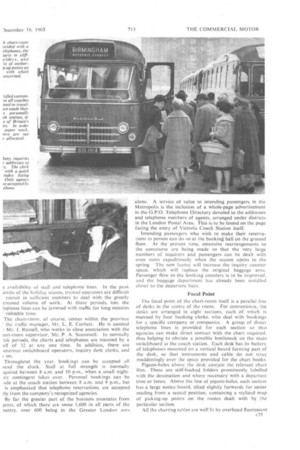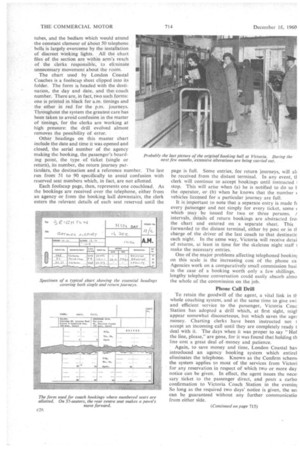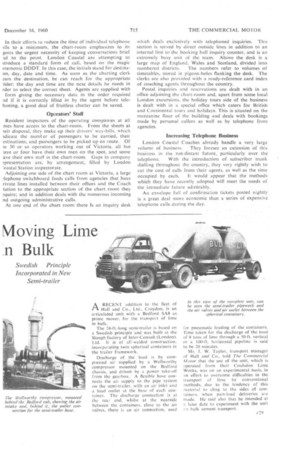8,000,000
Page 60

Page 61

Page 62

Page 65

If you've noticed an error in this article please click here to report it so we can fix it.
INTO
225,000
Reduction of Telephone Time and Cost is a Constant Problem of Britain's Busiest Chart-room—at Victoria Coach Station, London By Tom Walkerley THROUGH the portals of Victoria Coach 'Station. Buckingham Palace Road, London, S.W.1, in the course of a year pass 225,000 coaches and 8 million passengers. Almost without exception these passengers have pre-booked their seats, either at the London or destination terminals, personally or through an agent.
Clearly, to deal efficiently with a volume of traffic of this magnitude, the charting system must be massive in scope and as simple as possible in operation. Over the years, London Coastal Coaches, Ltd., have devised such a system. of which the only limiting factors are e availability of stall and telephone lines. In the peak onths of the holiday season, trained operators are difficult recruit in sufficient numbers to deal with the greatly creased volume of work. At those periods, too, the lephone lines can be jammed with traffic for long minutes ' valuable time.
The chart-room, of course, comes within the province the traffic manager, Mr. L. E. Corbett. He is assisted r Mr. J. Russell, who works in close association with the tart-room supervisor, Mr. P. A. Scammell. In normally .isk periods, the charts and telephones are manned by a aff of 32 at any one time. In addition, there are imerous switchboard operators, inquiry desk clerks, and on.
Throughout the year, bookings can be accepted all mad the clock. Staff at full strength is normally • quired between 8 a.m. and 10 p.m., when a small nightity contingent takes over. Personal bookings can be ade at the coach station between 8 a.m. and 9 p.m., but is emphasized that telephone reservations are accepted tly from the company's recognized agencies.
By far the greater part of the business emanates from lents, of which there are some 1,600 in all parts of the )untry. over 600 being in the Greater London area alone. A service of value to intending passengers in the Metropolis is the inclusion of a whole-page advertisement in the G.P.O. Telephone Directory devoted to the addresses and telephone numbers of agents, arranged under districts in the London Postal Area This is to be found on the page facing the entry of Victoria Coach Station 'itself.
Intending passengers who wish to make their reservations in person can do so at the booking hall on the ground floor. At the present time, extensive rearrangements to the concourse are being made so that the very large numbers of inquirers and passengers can he dealt with even more expeditiously when the season opens in the spring. The new layout will increase the inquiry counter space, which will replace the original baggage area. Passenger flow to the booking counters is to be improved, and the baggage department has already been installed closer to the departure bays.
Focal Point The focal point of the chart-room itself is a parallel line of desks in the centre of the room, For convenience, the desks are arranged in eight sections, each of which is manned by four booking clerks, who deal with bookings for a specific company or companies. A group of direct telephone lines is provided for each section so that agencies can make direct contact with the chart required, thus helping to obviate a possible bottleneck on the main switchboard at the coach station. Each desk has its battery of telephones mounted on a vertical board forming part of the desk, so that instruments and cable do not stray maddeningly over the space provided for the chart books.
Pigeon-holes above the desk contain the relevant chart files, These are stiff-backed folders prominently labelled with the destination and where necessary with a departure time or.times. Above the line of pigeon-holes, each section has a large notice-board, tilted slightly forwards for easier reading from a seated position, containing a stylized map. of picking-up points on the routes dealt. with • by the particular section.
All the charting tables are well lit by overhead fluorescent c25 tubes, and the bedlam which would attend the constant clamour of about 50 telephone bells is largely overcome by the installation of discreet winking lights. All the chart files of the section are within arm's reach of the clerks responsible, to eliminate unnecessary movement about the room.
The chart used by London Coastal Coaches is a foolscap sheet clipped into its folder. The form is headed with the destination, the day and date, and the coach number. There are, in fact, two such forms: one is printed in black for a.m. timings and the other in red for the p.m. journeys. Throughout the system the greatest care has been taken to avoid confusion in the matter of timings, for the clerks are working at high pressure: the drill evolved almost removes the possibility of error.
Other headings on this master chart include the date and time it was opened and closed, the serial number of the agency making the booking, the passenger's boarding point, the type of ticket (single or return), its number, the return journey particulars, the destination and a reference number. The last run from 51 to 90 specifically to avoid confusion with reserved seat numbers which, in fact, are not allotted.
Each foolscap page, then, represents one coachload. As the bookings are received over the telephone, either from an agency or from the booking hall downstairs, the clerk enters the relevant details of each seat reserved until the page is full. Some entries, for return journeys, will alt be received from the distant terminal. In any event, ti clerk will continue to accept bookings until instructed I stop, This will arise when (a) he is notified to do so t the operator, or (b) when he knows that the number vehicles licensed for a particular journey are full.
It is important to note that a separate entry is made ft every passenger and not simply for every ticket, some I which may be issued for two or three persons. 1 intervals, details of return bookings are abstracted fro the chart and entered on a separate sheet. This forwarded to the distant terminal, either by post or in a charge of the driver of the last coach to that destinatic each night. In the same way, Victoria will receive detai of returns, at least in time for the skeleton night staff I make the necessary entries.
One of the major problems affecting telephoned bookim on this scale is the increasing cost of the phone ca Agencies work on a comparatively small commission basi in the case of a booking worth only a few shillings, lengthy telephone conversation could easily absorb almo the whole of the commission on the job.
Phone Call Drill To retain the goodwill of the agent, a vital link in a whole coaching system, and at the same time to give swi and efficient service to the passenger, Victoria Coac Station has adopted a drill which, at first sight, migl appear somewhat discourteous, but which saves the ager money. Charting clerks have been instructed not t accept an incoming call until they are completely ready t deal with it. The days when it was proper to say " Hol the line, please," are gone, for it was found that holding th line cost a great deal of money and patience.
Again, to save money and time, London Coastal hay introduced an agency booking system which entire] eliminates the telephone. Known as the Confirm schem the system applies to most of the services from Victori for any reservation in respect of which two or more day notice can be given. In effect, the agent issues the nece: sary ticket to the passenger direct, and posts a carbo confirmation to Victoria Coach Station in the evenim So long as the required two days' notice is given, the set can be guaranteed without any further communicatio from either side. In their efforts to reduce the time of individual telephone ills to a minimum, the chart-room emphasizes to its gents the urgent necessity of keeping conversations brief :Id to the point. London Coastal are attempting to itroduce a standard form of call, based on the magic inemonic DDDT. In this case, the initials stand for destinaon, day, date and time. As soon as the -charting clerk ears the destination, he can reach for the appropriate Ader: the day and time are the next details he needs in rder to select the correct sheet. Agents are supplied with form giving the necessary data in the order required nd if it is correctly filled in by the agent before telehoning, a good deal of fruitless chatter can be saved, Op2rators' Staff Resident inspectors of the operating companies at all mes have access to the chart-room. From the sheets at lendisposal, they make up their drivers' way-bills, which idicate the num/ er of passengers to be carried, their estinations, and passengers to be picked up en route. Of le 30 or so operators working out of Victoria, all but wee or four have their own men on the spot, and some ave their own staff in the chart-room. Gaps in company !presentation • are, by arrangement, filled by London ;oastal Station inspectorate.
Adjoining one side of the chart room at Victoria, a large !lephone switchboard feeds calls from agencies that have rivate lines installed between their offices and the Coach tation to the appropriate section of the chart, room they !quire; and in addition deals with the numerous incoming nd outgoing adminiStrative calls.
At one end of the chart room there Is an inquiry desk
which deals exclusively with telephoned inquiries. This section is served by direct outside lines in addition to an internal line to the booking hall inquiry counter, and is an extremely busy unit of the team. Above the desk is a large map of England, Wales and Scotland, divided into
numbered districts. The numbers refer to volumes of timetables, stored in pigeon-holes flanking the desk. The clerks are also provided with a ready-reference card index of coaching agents throughout the country.
Postal inquiries and reservations are dealt with in an office adjoining the chart-room and, apart from some local London excursions, the holiday tours side of the business is dealt with in a special office which caters for British and Continental tours and holidays. This is situated on the mezzanine floor of the building and deals with bookings made by personal callers as Well as by telephone from agencies.
Increasing Telephone Business
London Coastal Coaches already handle a very large volume of business. They foresee an extension of this business in the not-distant future,. particularly Over the telephone. With the introduction of subscriber trunk dialling throughout the country, they very rightly wish to cut the cost of calls from their agents, as well as the time occupied by each. It would appear that the methods which they have recently adopted will meet the needs of the immediate future admirably.
An envelope full of confirmation tickets posted nightly is a great deal more economic than a series of expensive telephone calls during the day.
























































































































